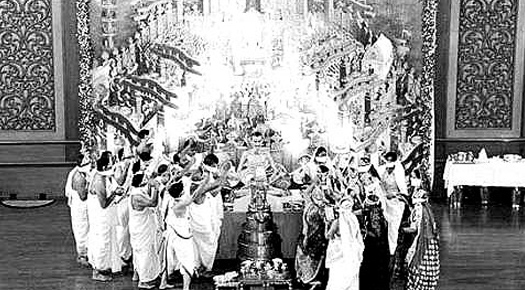
The Indian state of Haryana recently joined four other states, including Maharashtra, Rajasthan, Gujarat and Chhattisgarh, which have already banned the sale of meat during the Jain festival Paryushan that is observed from September 10 to 17.
Paryushan is an important festival observed by both Svetambara and Digambara sects of Jainism. While the former observes Paryushan for eight days, the latter carries out the rituals for two additional days. Considered as the coming together of all Jains, the festival encourages its congregation to take vows of studying and fasting with a degree of spirituality that is similar to temporary monasticism.
On September 11, the ban in Maharashtra was reduced from four days to two days by the state government after receiving flak from the state judiciary, which called the prohibition regressive and inappropriate for modern days. The ban drew stiff opposition from various quarters, including Bhartiya Janta Party’s own ally Shiv Sena, which condemned the move as religious terrorism and accused those responsible for it of promoting religion-based politics. Civic officials defended their decision, saying such bans have been implemented during Paryushan for several years now. Trying to justify the move with some bizarre rationale that focuses on disallowing ‘slaughter’ during any fasting period, the officials also said that the ban was restricted to only certain meat, as the sale of fish and other seafood would not be affected.
“On these four days, BMC slaughterhouses will be shut and sale of meat will also be prohibited. The market department (of BMC) has been asked to enforce the ban and ensure no animal is slaughtered and no meat is sold anywhere in the city,” a senior civic official had said.
BJP spokespersons across the country said the prohibition was not so much a ban as a gesture to show tolerance towards every community in the name of secularism.
Opposing the ban, Mumbai’s Qureshi community that delves in different kinds of meat businesses said they would suffer heavy losses if the ban were to be implemented for so many consecutive days.
On the same day that Maharashtra reduced the duration of its ban, the government in the state of Chhattisgarh ordered a similar ban on the sale of meat for eight days.
“Like every year, the Urban Administration Department has issued directives to civic bodies to keep all the slaughterhouses and meat shops closed from September 10 to 17 for the Jain Paryushan’ Parv and Ganesh Chaturthi,” Jitendra Shukla, a senior official in Chhattisgarh told the the media.
In Haryana too, Fatehabad Municipal Corporation issued a notice to owners of slaughterhouses, warning them of severe legal repercussions if the ban was to be violated.
“This is the first time that such a ban order has been issued. It is ironical why no such order is issued during Navratri,” said Salim, spokesperson of the Meat Market Association in Fatehabad.
Quite naturally, the ban went on to stir a debate about whether or not one person’s religious freedom should be allowed to interfere with another’s dietary preferences. The ban, which has now been imposed in five states, is being seen as a problem for more than one reason even though most critics are trying to come to terms with how state authorities can expect the majority of any population to forcefully compromise with their food choices in the name of secularism.
Photo Credits: Shrimad Rajchandra Mission
